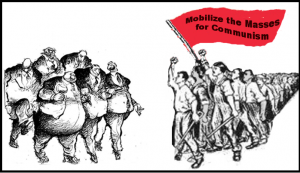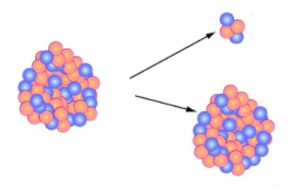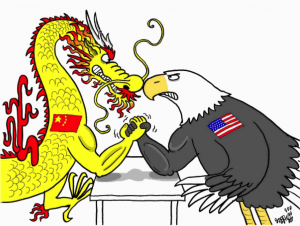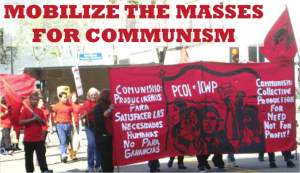Fighting for Change: Masses Need Dialectical Materialist Philosophy to Defeat Capitalism and Mobilize the Masses for Communism
Draft 0.92, August 20, 2020
Printed and PDF Versions here
Contents
- Introduction
- Connections
- Dialectical Contradictions
- Why Dialectical Contradictions Matter
- Contradictions Between Capitalists
- The Main Contradiction
- Internal Contradictions
- Internal Contradictions of Capitalism
- How Contradiction End
- Dialectical Development
- Priorities in Making the Party Grow
- The Internal is Primary
- Using Dialectical Materialism
The communist philosophy of dialectical materialism is vital to understand how the masses can make a communist revolution. Philosophy is not just a personal point of view or a set of values. It describes reality. It says what is real and what isn’t. It tells us how to learn about reality and how to change it.”
Philosophy is part of class struggle. Different ideas in philosophy are part of the struggle between capitalists who are trying to continue ruling us, and the masses who are trying to survive and throw off capitalist rule.
Capitalist philosophy says that their system will last forever, and that real change is not possible.
Dialectical materialism says that reality is always changing, and we can understand how it changes.
Capitalist philosophy tells us that truth is impossible or that the masses cannot know what is true. It claims gods, ideas and thinking, or supernatural forces determine what happens.
Dialectical materialism says that material forces, including the actions of masses of people, determine what happens. The masses can use knowledge learned from work and practical activity to reveal capitalism’s weaknesses and overthrow it. We can use that knowledge to build a new communist world.
Connections
Dialectical materialism says that different parts of reality are connected in time and space. This is true for the whole universe, including the earth and its societies. The weather in the south Pacific (“El Nino”) affects the weather in faraway parts of the earth. Marxism arose in Europe but spread around the globe. Anti-racist protests and rebellions in one place inspire people in other places. Past events like slavery, apartheid, revolutions and wars have long-lasting effects.
Two things are connected when one affects the other or both affect each other. Connected things can be similar or different, but similar events often happen because they are connected.
One of the most important kinds of connections is the connection between things that conflict with each other. The heart of dialectics, the communist philosophy of change, is a simple idea that has deep consequences: Things change mainly because of the conflicts that go on inside of them. For us, the most important example of this dialectical principle is the connection between capitalists and workers inside the capitalist the production process.
Although capitalists exploit workers, workers need to work for them in order to live. Capitalists also need workers, or they can’t make profits. Workers try to get as high a wage as they can, and capitalists pay as little as they can get away with. So, workers and capitalists need each other, but they are in conflict and often fight each other.
Working for a capitalist or a capitalist state (or trying to) is what makes a people and families part of the working class. Workers must adapt to the bosses’ domination to make a living. Likewise, bosses have to do what it takes to dominate workers. Each side is made what it is by their connection to each other.
Dialectical Contradictions
The capitalist-worker connection is a basic example of a dialectical contradiction. A dialectical contradiction is a pair of connected things where (a) the two sides are at least partly made what they are by that connection, and (b) the two sides also interfere with each other, hold each other back or actually fight with each other.
 Things contradict each other when they are linked together but also fight each other
Things contradict each other when they are linked together but also fight each other
A dialectical contradiction is different from the ordinary sense of the word. “Contradiction” usually means saying something and then denying it, like “it is raining,” and “it is not raining. Contradictions like this can be found only in talking, writing or thinking.
Dialectical contradictions can happen in thinking but they also happen between things or activities everywhere in the real world. A football match is a dialectical contradiction. Two teams are connected because they are playing the same game. Each side has to change itself and adjust to its opponent if it is going to have a chance to win the game.
There are also contradictions inside a person who has conflicting goals. Trying to “stay out of trouble”, for example, contradicts trying to lead workers to fight for communism.
Dialectical contradictions take place in all of reality. In the physical world, there are contradictions between the forces that pull the parts of atoms together and those that push them apart. In some kinds of atoms, called “radioactive,” the forces that pull apart are stronger and the atoms come apart.

Radioactive Atoms Split Because of Their Internal Contradictions
A volcano is the result of the pressure of melted rocks overcoming the pressure of the earth’s crust, which is holding the hot rocks in. A communist revolution is a social explosion. It happens when the organized armed working class overcomes the armed power of the capitalists.
Why Dialectical Contradictions Matter
Contradictions are important because they cause changes to happen, or in some cases, prevent changes. The worker-capitalist contradiction is underlying cause of strikes, anti-racist protests, and rebellions that happen everywhere in the world. This worker-capitalist contradiction will eventually drive the working class to overthrow capitalism.
Typically, the two sides of a dialectical contradiction interfere with each other more and more. Their conflict becomes more obvious. This is called “development.” Contradictions inside a political party can become so strong that they prevent it from doing anything significant—or even cause a split. Contradictions between imperialist powers like the US and China can develop from mild conflict to trade wars to huge shooting wars, like the world wars in the 20th century.
Contradictions between capitalists
Dialectical contradictions between capitalist powers are causing big economic and military changes everywhere. Hot wars are going on in the Middle East and in Ukraine. Threats and military buildups are taking place in the US, China, India, Syria, Ukraine and other places. These conflicts are driven by the contradictions between capitalist powers. Each has to try to control as much as it can of the planet’s resources (oil, mineral ores, water, agricultural land), as well as workers to exploit and markets where capitalists can sell their products.
The Main Contradiction
Every process or system contains many contradictions. At any time, one is stronger than all the others. It is driving the development of the system. This is called the main contradiction.
The class struggles are the result of contradictions found everywhere under capitalism. These include racism and the fight against it, and the contradiction between capitalist production and the environment.
But the main contradiction today is global competition among imperialist powers.
Major wars continue in Somalia, Syria, Libya, Afghanistan, Yemen and elsewhere. Threats, military buildups and fights are escalating on almost every continent.
Today these inter-imperialist contradictions are the main cause of changes in the world’s economy and politics. The biggest of these—the main contradiction—is between the US and Chinese capitalists. It overshadows all other conflicts.
 The Contradiction Between the US and Chinese Capitalists is the Main Contradiction in the World Now
The Contradiction Between the US and Chinese Capitalists is the Main Contradiction in the World Now
Other contradictions between capitalist powers matter, too: US against Russia in Syria and Ukraine, China versus India, Iran versus Saudi Arabia and Israel, etc. But the big one is the US versus China.
When we analyze developments in a country, we must ask how global capitalist contradictions affect it. The world capitalist crisis can sharpen the class contradiction inside that country. It can lead to massive workers’ rebellions.
At some point, the growth of the communist movement will change the main contradiction globally to the class struggle between the international working class and international capital.
Internal Contradictions
Contradictions are always internal to some thing, process or system. They are the biggest influence on how a thing changes. A person who is exposed to disease germs may or may not get sick. That depends on the struggle of their immune system against the germs. A person who has another disease or doesn’t have enough food is more likely to get sick because their immune system is weak.
The general principle is that internal factors determine what effect the external factors will have. Internal contradictions are primary. When the climate changes, for example, the harm done to people depends on what internal preparations are made to deal with it, not just how much the temperature or sea level goes up externally.
Internal Contradictions of Capitalism
Of the many contradictions capitalism, the most basic is this: Capitalism needs to grow in order to continue existing. To do this, it has to aim for an unlimited increase in capitalists’ wealth and production capacity, while it has to limit the mass of producers to bare necessities. This contradiction always present, but not necessarily the main contradiction at a specific time.
How Contradictions End
Ending a contradiction is called resolving it. The victory of communism will resolve the contradiction between the working class and the capitalist class by destroying the capitalist class. This is typical of how contradictions are resolved: one side defeats the other or even destroys it, often with a sudden dramatic result.
Resolving a contradiction always leads to new contradictions, and the defeated side always leaves traces of itself behind. These traces could even be the basis for a future revival of the defeated side. After capitalism is destroyed some of its ideology and habits such as racism, sexism, and individualism will remain temporarily, causing more contradictions. Our party will lead masses to struggle against these things as long as it takes to wipe them out forever.
How contradictions get resolved
Contradictions move toward resolution by developing–by the conflict between the two sides becomes stronger and more intense. Different kinds of contradictions develop in different ways. The masses move toward resolving their contradiction with the capitalists by organizing for revolution, becoming more united around communist politics and better prepared for an eventual armed struggle.
Dialectical Development
All processes are driven forward by their internal contradictions. Because of these contradictions, things do not change in a smooth and gradual ways all the time. Gradual changes are interrupted by very fast changes: explosions, jumps to new conditions, catastrophes, and rebellions.
We have seen many dramatic changes recently: the 2008 economic crisis, the environmental crisis, new, more fascist conditions in many places, a global pandemic that causes massive deaths, and world-wide rebellions after the murder of George Floyd. The cry of “I can’t breathe” has been taken up by many workers pressed down harder by capitalism.
Ideas from dialectical materialism are vital to understand these twists and turns in world history. One essential idea is qualitative change. A qualitative change is a big shift in the way something behaves, a shift that often makes us act differently toward it. A qualitative change is a kind of break or jump in a process.
Qualitative change can be simple, like water boiling to change from a liquid into steam. Adding enough heat makes this change. This is an example of a fundamental law of dialectics: Qualitative change can result from change in the amount of something. Change in quantity, continued far enough, produces a qualitative change. This is a law of dialectics. Jumps and breaks have to happen.
The worldwide movement of protest against the murder of George Floyd is qualitatively different from the reaction to previous racist police killings. Police murder of workers, especially of racial minorities, is a constant occurrence in the US and in other countries.
The quantity of these crimes is large. This time, we have seen a qualitative change, from local protest movements to global outrage. The large number of non-black people in the protests is also a qualitative change. Change in quantity turns into change of quality, and produces a new situation of mass, multi-racial expression of hatred for the police and their capitalist bosses. That is a step closer to mass understanding of racism as organized oppression maintained by capitalists to enforce their rule over the working class.

Multi-Racial Mass Protest in France Against Racist Police Murders, June 2020
The present pile-up of explosions and catastrophes shows that capitalism is becoming more fragile as its contradictions grow stronger. It copes very badly with any event that disrupts the flow of profits or capitalist control over workers. Capitalism’s internal contradictions constantly produce these crises. Such crises give us chances to grow by leaps and eventually win.
In 1905 in Russia, communists were defeated in a failed revolution. Twelve years later, they won a second revolution.
Two things were crucial for this change. First, Russian workers learned from their defeat and followed a renewed communist party that led them to victory. Second, world capitalism weakened due to the huge imperialist slaughter of World War I. This weakness was even greater in Russia than in other capitalist powers.
The contradictions of capitalism that are growing today make it possible for us to win. But we must learn how, and carry the fight to the end.
Priorities in Making the Party Grow
Materialism says that the basis of all knowledge is practical activity. That activity aims at changing some part of reality.
People can and must learn from the experience of others. But personal participation is crucial. We will understand the nature of capitalism and the possibilities of mass struggle against it only by fighting the bosses collectively. We must be involved in practical struggles of the working class and bring communist ideas into these struggles.
Our goal is always winning the masses to join the party through conversations, distributing Red Flag and other activities. Long experience shows that by itself, working in reform movements will not win workers to communism. Only the party’s mobilizing the masses for communism can do that.
The Internal is Primary
Sometimes we who want the communist movement to advance but are reluctant to do the specific political work needed to advance. What we need to do and what we actually are doing come into contradiction. Like all contradictions, these are not resolved by ignoring them.
Contradictions within party collectives are mainly disagreements about how to understand the situation we are in and what to do about it. These contradictions involve both theory and practice. They are contradictions between right and wrong ideas, not as contradictions between the individuals who have these ideas.
What we do must be guided by communist theory, by the experience of past revolutionaries, and by out own experience.
How does a collective decide which ideas are right? By sharpening the debate, making our plans and carrying them out. Then we evaluate the results to improve our theory and our practice through criticism and self-criticism.
The result will be more objective if the process includes everyone we work or organize with. The aim is to arrive at the best result for the fight for communism.
Using Dialectical Materialism
The working class needs dialectical materialism as a weapon in the fight for communism. We use it to understand reality and build confidence that we can do the communist political work of organizing for revolution and beyond.
ICWP is committed to develop communist philosophy and arm the working class with it. Learn dialectical materialism and use it in the fight! Join ICWP!
International Communist Workers’ Party
http://ICWPRedFlag.org
Twitter: @RedFlagBandera
Instagram: @icwprf Facebook: icwpredflag


